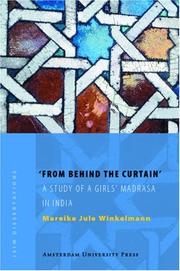| Listing 1 - 4 of 4 |
Sort by
|
Book
ISBN: 0803996713 Year: 1991 Publisher: New Delhi Newbury Park London Sage Publications
Abstract | Keywords | Export | Availability | Bookmark
 Loading...
Loading...Choose an application
- Reference Manager
- EndNote
- RefWorks (Direct export to RefWorks)
Book
ISBN: 0249441497 9780249441499 Year: 1977 Publisher: London: Hill,
Abstract | Keywords | Export | Availability | Bookmark
 Loading...
Loading...Choose an application
- Reference Manager
- EndNote
- RefWorks (Direct export to RefWorks)
Housing --- Urbanization --- Urbanisation --- Logement --- -Housing --- -Urbanization --- -#SBIB:316.334.5U20 --- Cities and towns, Movement to --- Urban development --- Urban systems --- Cities and towns --- Social history --- Sociology, Rural --- Sociology, Urban --- Urban policy --- Rural-urban migration --- Affordable housing --- Homes --- Houses --- Housing needs --- Residences --- Slum clearance --- Urban housing --- City planning --- Dwellings --- Human settlements --- Sociologie van stad (buurt, wijk, community, stadsvernieuwing) --- Social aspects --- Wonen --- Algemeen. --- #SBIB:316.334.5U20 --- Housing - India - Delhi --- Housing - Developing countries --- Urbanization - Developing countries

ISBN: 9053569073 9786611979089 1281979082 9048504414 9789048504411 9789053569078 9781281979087 Year: 2005 Publisher: Amsterdam : Amsterdam University Press,
Abstract | Keywords | Export | Availability | Bookmark
 Loading...
Loading...Choose an application
- Reference Manager
- EndNote
- RefWorks (Direct export to RefWorks)
This study investigates how madrasas for girls emerged in India, how they differ from madrasas for boys, and how female students come to interpret Islam through the teachings they receive in these schools.
Islam --- Developmental psychology --- Educational systems. Teaching systems --- Didactics --- India --- Madrasahs --- Women --- Islamic education --- History. --- Education --- Education, Islamic --- Education, Muslim --- Muslim education --- Human females --- Wimmin --- Woman --- Womon --- Womyn --- Females --- Human beings --- Femininity --- Madrasas --- Madrassahs --- Madrassas --- Medreses --- Schools --- Muslims --- Madrasehs --- Medressehs --- Islamic religious education --- fundamentalism --- women --- religie --- religious education --- anthropologie --- india, delhi --- women's education --- gender --- islamism --- religion --- education --- piety movements --- anthropology --- madrasa --- tabligh jamaat --- Single-sex education --- Girls --- Curriculum --- Book
Book
ISBN: 9780520960503 0520960505 9780520284807 0520284801 9780520284821 0520284828 Year: 2015 Publisher: Berkeley, CA : University of California Press,
Abstract | Keywords | Export | Availability | Bookmark
 Loading...
Loading...Choose an application
- Reference Manager
- EndNote
- RefWorks (Direct export to RefWorks)
The inequalities that structure relationships in Delhi's urban slums have left the health of women living there chronically vulnerable. Yet for women living in slums, there is no other option than to depend on someone. Based on fourteen months of intensive fieldwork with ten families in a Delhi slum, No One Will Let Her Live argues that women rely on moral strategies to confront the poverty and unstable relationships that threaten their well-being. Claire Snell-Rood breaks new ground by delineating the complex ways in which women set boundaries, maintain their independence, and develop a nuanced sense of selfhood that draws on endurance, asceticism, mobility, and citizenship.
Well-being --- Poor women --- Feminization of poverty --- Women, Poor --- Poor --- Women --- Welfare (Personal well-being) --- Wellbeing --- Quality of life --- Happiness --- Health --- Wealth --- Health and hygiene --- Social conditions. --- Economic conditions --- Well-being - India - Delhi. --- asceticism. --- citizenship. --- delhi slum. --- delhi. --- demolition. --- endurance. --- family. --- gender and women studies. --- gender studies. --- health. --- human condition. --- impoverished women. --- independence. --- india. --- inequality. --- mobility. --- moral citizenship. --- moral strategies. --- morality. --- neighbors. --- poor. --- poverty. --- public policy. --- relationships. --- selfhood. --- setting boundaries. --- slum environment. --- social services. --- survival. --- urban cities. --- urban slums. --- urban studies. --- urban. --- well being. --- women living in slums.
| Listing 1 - 4 of 4 |
Sort by
|

 Search
Search Feedback
Feedback About UniCat
About UniCat  Help
Help News
News